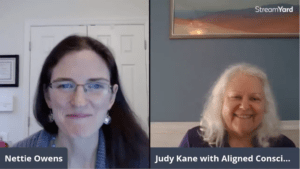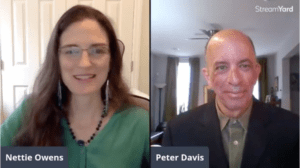How did this business evolve over the years?
I started as a speech and language pathologist working with people – more adults than children – but people with speech, language, voice disorders, and communication disorders. And I saw how important communication is when you lose it. I switched over to people who are emerging leaders and professionals who want to move up in their career, and they need to find their voice but not just find their voice like you often hear – but use their voice in a way that’s consistent with their image that they want to project.
Over the years, I started working with international clients who needed help not because they needed to eliminate an accent, but due to their accent, their expertise wasn’t getting translated or communicated effectively. And so, you have these doctors and scientists who are brilliant and have advanced degrees, and when they get up to present, you have trouble understanding them. So, I started helping people with that.
And then we got to COVID. People have remote and virtual meetings, which I’ve been doing virtual for years. But what started happening, we started having networking events and meetings and things virtual. And what happened, people thought they could be casual, or they could have the laundry basket in the background, or the cat walking across the screen. And some people will argue and say that’s authentic. I will say yes, there’s an authenticity that we like to have, but we’re always sending out signals and messages about our professionalism.
I’ve learned watching people in Zoom meetings back in March of 2020 that the person who I thought was so polished and professional had an alter ego – and they were showing that alter ego for their line of business. It didn’t work. For some, it works fine, but for others, it doesn’t.
I don’t have one way to do things, but you should know what image you want to project.
I started working with a lot of people to pay more attention to what they are sending out in these virtual meetings vocally. And what are they saying? Because we’ve been to a lot of Zoom meetings that go on and on and on. So, I’d say my business has really blossomed because of that – because people had to learn a new way to communicate or learn that it’s not that different. You can’t just sit that camera up in a dark room and say that it’s okay to show up that way.
“I think there’s an expectation that has changed too. I think prior to so much going online, you could get away with attending a virtual meeting and never turning your camera on. But in this past year, it’s become the expectation that you show up visibly because we’re not going to be meeting with you in a room physically. So, we want to see you. We want to engage with you. Turning the camera on has not been optional. And, perhaps, people who didn’t feel comfortable being in front of the camera before are now being required to be in front of the camera and don’t necessarily know how to do that well or present in the way they would want to present.”
What communication skills do business owners need to master to be successful?
Let me start by saying many of us think we have to speak a certain way. I believe this, of course. We believe that we need to speak a certain way and sound a certain way, but the most important skill for a business leader is none of that. It’s to be a good listener. You need to be a good listener, curious, and interested in the other person – as Dale Carnegie has said, not to try to be the most interesting person in the room.
And I think we can use that a lot because we’re getting thrown into it, and people will be going back to the workplace soon, but these skills work everywhere.
But on these Zoom sessions, we were thrown into these breakout rooms. And in these breakout rooms, we have maybe a minute or two to share who we are. And it’s all about me, me, me, me, me. And then somebody is not finishing, and then the fourth person doesn’t get a chance to talk. So we know who we are, but people will like us more if you take more interest in them. And I think that’s basic sales advice – all the time. Know the questions to ask, be a good listener, and show up that way.
I’m not saying speaking isn’t important because I work on it all the time. But people forget how important listening is because we all stress that we’re in the room, it’s going to be our turn to talk, what are we going to say – and then it becomes all about us. So we have to really think about other people and ask, “What can I help you with?” – rather than talking about what I do.
Do you recommend having some prepared questions that help you engage in listening from the beginning?
Part of it is knowing your audience. I do a lot of coaching and public speaking, and I do masterclasses, and one of the first things I say to people is: know your audience. If you’re in a certain type of meeting, hopefully, you know what you may have in common. You know what the topic might be about. Ask questions about that. Be curious about the other person. And again, we often think we’re so ready to reply and just give what we want to say that we truly are not listening to that other person.
It sounds like a prepared pitch when we have that prepared pitch, and I just worked with somebody on this today. So, people don’t feel like you’re speaking with them. Don’t memorize them – just talk! Because when we start to talk, we come across better. And so, be curious. Why did somebody come to you to talk at that meeting today? What do they hope to get out of this breakout room? It turns the tables. And when you get other people to talk, it comes naturally like a conversation like we’re doing here today.
3 Action Steps
- Be aware of the image you want to project.
- Work on your effective listening skills to be a good leader.
- Be curious about the people you are interacting with in order to engage in conversations that will benefit both of you.
Connect with Lynda Katz Wilner on LinkedIn or at Successfully Speaking.
Please comment below. I would love to hear from you.














No comments yet.